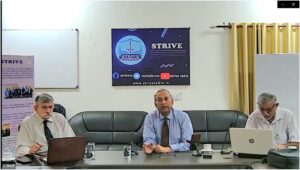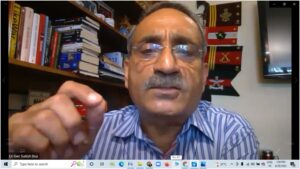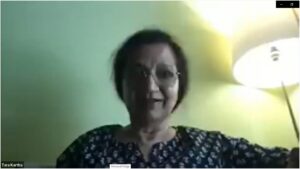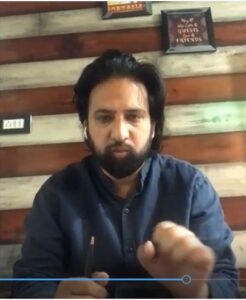Important Issues Flagged during the Webinar on “Kashmir: Current, Future and Indo-Pak Rivalry”.
![]()
General
A webinar was conducted under the aegis of the STRIVE on 28 Aug 2028 on the above subject. The main speakers were as follows: –
- Lt Gen Satish Dua, PVSM, UYSM, SM, VSM (Retired), Former Chief of Integrated Defence Staff to the Chairman Chiefs of Staff Committee and the General Officer Commanding 15 Corps.
- Dr Tara Kartha, Distinguished Fellow IPCS
- Sri Touseef Raina, President Municipal Council Baramulla
 The discussion was presided over by Maj Gen A Parmar, VSM, Chairman STRIVE, and was moderated by Maj Gen Harsha Kakar, the Academic Head of the Strive. The audience comprised of a number of veterans, serving officers and academicians.
The discussion was presided over by Maj Gen A Parmar, VSM, Chairman STRIVE, and was moderated by Maj Gen Harsha Kakar, the Academic Head of the Strive. The audience comprised of a number of veterans, serving officers and academicians.
Important Issues Flagged during the Webinar
Maj Gen A Parmar, VSM, Chairman, STRIVE, in his opening remarks, mentioned that there has been a marked improvement in the situation and the efforts made to bring the people of J&K has started bearing the fruits. However, the policy needs to have the following elements to achieve emotional integration of the people of J&K with rest of the Country: –
- Pursuit of current policies with patience.
- Deft handling of delinquency, which is neither too strong nor is amounting to appeasement.
Maj Gen Kakar, while introducing the topic of the discussion requested the distinguished speakers to focus on following issues: –
- Contours of the Current Security environment.
- Government Strategy for the future.
- Kashmir issue in the context of Indo- Pak relations.
- Reasons for back-channel discussion not bearing the desired results.
- Ways and means to tackle hybrid terrorism.
- Reasons for the radicalization of the society and strategy to handle it.
 Lt Gen Dua, dealt with issue of evolution of the terrorism in the Valley and the strategy to tackle it. Major points flagged by him were as follows: –
Lt Gen Dua, dealt with issue of evolution of the terrorism in the Valley and the strategy to tackle it. Major points flagged by him were as follows: –
- There is a fear of uncertainty in the minds of youth- there is a need to create hope.
- 2015 onwards extensive use of social media by the handlers of terrorism resulted into radicalization and use of internet as a force multiplier.
- Signs of changes since the abrogation of Article 370- stone pelting has almost stopped.
- Rise of The Resistance Force (TRF)- change in strategy of terrorists. Now they go for target killings to cause destabilization of the process of normalization.
- Changes since 2019- the development indices are giving confidence and are helping the administration to get the distrust reduced. However, it is likely to take time for the mindset to change, hence the need for patience. Aspirations of people are to have more economic opportunities. Already, people have started questioning the outcome of Jehad- time is ripe to deal with more aggressively in the mind space of people with a view to reassure them that their future lies with India.
- Some of the recommended elements of the course correction needed are as follows: –
- Need to have element of Healing touch as part of the strategy.
- Security Forces should consider engaging with the Stone pelters/ potential stone pelters.
- Government needs to consider Maharashtra Model for deradicalization, which is based addressing socio-economic issues. It may also entail police personnel turning into counselors.
- There is a need to strengthen the civil society.
- Re-introduction of the political process needs to be hastened up- momentum of introduction of three tier of grass root level of democracy needs to be continued.
- India needs to revise strategy to tackle ISPR instead of ISI- need to address fear psychosis of people by aggressive use of social media.
 Dr. Tara Kartha highlighted that the back-channels talks had continued even post Mumbai attack and even now they are taking place. Some of the important issues highlighted by the distinguished speaker were as follows: –
Dr. Tara Kartha highlighted that the back-channels talks had continued even post Mumbai attack and even now they are taking place. Some of the important issues highlighted by the distinguished speaker were as follows: –
- Most successful dialogue between India and Pakistan was when Gen Musharraf was in power- It clearly brings out that it is best to talk to Army in Pakistan who actually wields power in Pakistan.
- The Map controversary[1] in Aug 2020 gave a major setback to the back-channel talks-onus is on Pakistan to set the record straight and try to rebuild the confidence.
- Pakistan is presently in a terrible state. Her resources are shrinking. Economic difficulties of Pakistan are increasing due to Ukraine war and Climate Change. One of the major effects of climate change is shrinking water table which among other things is likely to affect the food security of the country- Pakistan needs to use its territory for geoeconomics. In this connection Pakistan should try to open trade with India. Use of Pakistan as a transit corridor for trade between India and Afghanistan, Iran and Central Asia should be the way ahead. It will also help in reducing Chinese influence in Pakistan.
- Situation post rendering of Article-370 and Article 35 A inoperative, situation has changed. However, Pakistan wants a face-saving measure to bring the backchannel talks back on rail. India’s view is that what India has done with Article-370 is her business.
- Pakistan is slowly attempting to incorporate Gilgit-Baltistan and POJ&K (so-called Azad Kashmir) into Pakistan, basically with view to further Chinese interests in these regions. These actions indicate that Pakistan is trying to change the method of calculation along the LOC and the LAC.
- Pakistan needs to start dialogue without preconditions.
 Touseef Raina, highlighted the following issues: –
Touseef Raina, highlighted the following issues: –
- The Government needs to give space to youth and engage with them- presently the government is not doing enough to address the issues of youth and that is one of the reasons for their falling into the trap of Pak mis-information campaign.
- Dealing with people- the government needs to engage with silent majority directly rather than dealing through those self-appointed main-stream leaders who have vested interests. In this direction corruption of these so-called leader needs to be not only highlighted but action needs to be initiated against them.
- Dialogue should be with all stake holders especially those who believe in the idea of India- in this connection steps taken by the current administration and the army through SADBHAVANA are quite appreciable. This year during Independence Day celebrations Internet services were not closed and it was a welcome step.
- Need to deal with the misinformation campaign of Pakistan and the vested political lobby needs to be contested through a well thought comprehensive campaign. Pakistan’s efforts to cause trouble and disturb peace need to be exposed.
- Mainstream media needs to become more responsible and should use their discretion to avoid glorification of trouble creators, anti-national elements, and corrupt politicians
- The three-tier grass root democracy needs to be strengthened.
Lt Gen LK Pandey, AVSM& Bar, VSM, a member of the Team STRIVE, who has a very rich experience of having served in J&K, felt that India should not be too concerned with what Pakistan does, because she will also attempt to create mischief in the valley and therefore India needs to concentrate on what she should do to improve the situation in J&K. He gave following suggestions: –
- The army needs to re-establish the authority of the State.
- Efforts need to be made to improve the situation in a manner that it becomes conducive for the conduct of the elections.
- State needs to go for better governance and create environment for sustained good governance.
- Army should also need to think in terms of withdrawing to barracks at some point of time- both Lt Gen Dua and Mr. Touseef Rana felt that time was not ripe for Army to withdraw.
Conclusion
It was a well-attended webinar wherein the audience took a keen interest in the deliberations and asked some very pertinent questions. Most of the queries raised by the audience were answered by the Speakers and their reply has already been incorporated in their respective talks above. The webinar was declared closed by Maj Gen AK Chaturvedi, AVSM, VSM, the Vice chairman after conveying thanks to the speakers and the audience.
By Team STRIVE
Note
[1] On August 4, Pakistan Prime Minister Imran Khan announced a new political map of Pakistan. This map has claimed the entire region of Jammu and Kashmir stretching all the way to the edge of Ladakh. The map also lays Pak claims on Junagarh and Manavadar, a former princely State and territory, respectively, that are part of present-day Gujarat. It leaves out a claim line at the eastern end of J&K indicating Pakistan’s willingness to make China a third party in the Kashmir issue. This clearly runs counter to the Shimla Agreement which treated Kashmir as a bilateral matter. Pakistan also claimed the entire territory and water bodies that fall in the Sir Creek region in the westernmost part of India.
Webinar on Kashmir: Current, Future and Indo-Pak Rivalry – On You Tube ⇓
Disclaimer: The views expressed are those of the Team STRIVE and do not necessarily represent the views of the any other organisation/ individual that he belongs to or of the STRIVE.





